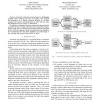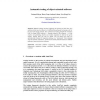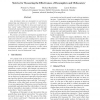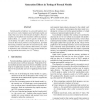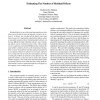1813 search results - page 13 / 363 » Measuring the Effectiveness of Software Testing |
KBSE
2008
IEEE
14 years 1 months ago
2008
IEEE
—Automatic white-box test generation is a challenging problem. Many existing tools rely on complex code analyses and heuristics. As a result, structural features of an input prog...
SOFSEM
2007
Springer
14 years 1 months ago
2007
Springer
Effective testing involves preparing test oracles and test cases, two activities which are too tedious to be effectively performed by humans, yet for the most part remain manual. T...
IWPC
2007
IEEE
14 years 1 months ago
2007
IEEE
Java developers often use decompilers to aid reverse engineering and obfuscators to prevent it. Decompilers translate low-level class files to Java source and can produce “good...
ISSRE
2002
IEEE
14 years 12 days ago
2002
IEEE
Formal analysis of software is a powerful analysis tool, but can be too costly. Random search of formal models can reduce that cost, but is theoretically incomplete. However, rand...
HASE
1998
IEEE
13 years 11 months ago
1998
IEEE
Residual defects is one of the most important factors that allow one to decide if a piece of software is ready to be released. In theory, one can find all the defects and count th...
